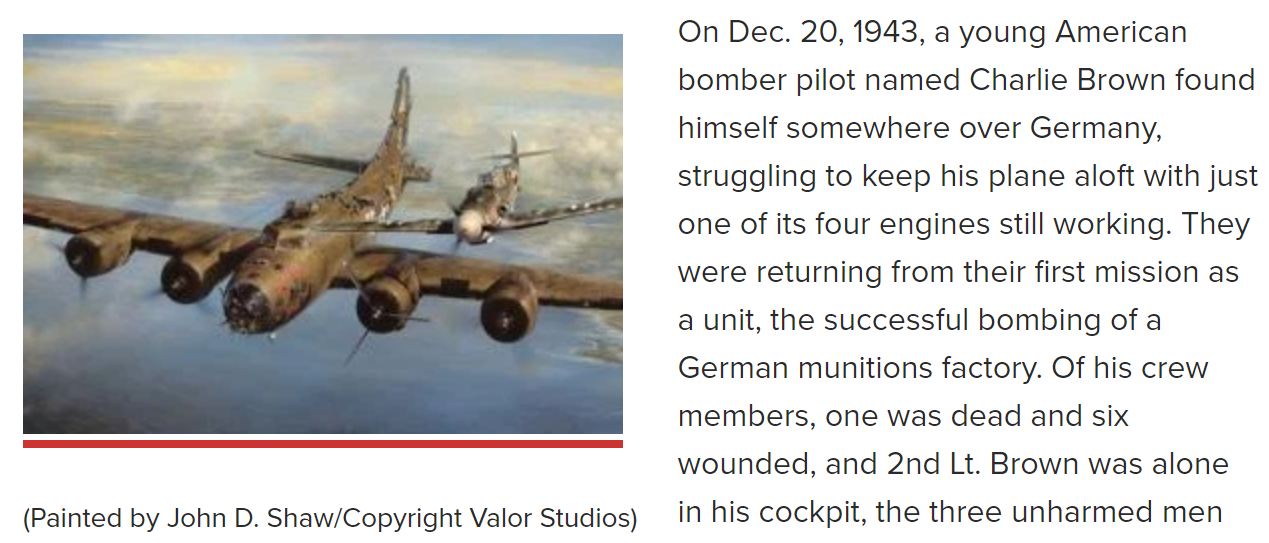










HONOR IN WARTIME: American WWII pilot Charlie Brown (left) was struggling to keep his damaged bomber airborne in the skies over Germany in 1943 when Luftwaffe ace Hanz Stigler (right) flew alongside. Instead of firing, Stigler gave a salute. () On Dec. 20, 1943, a young American bomber pilot named Charlie Brown found himself somewhere over Germany, struggling to keep his plane aloft with just one of its four engines still working. They were returning from their first mission as a unit, the successful bombing of a German munitions factory. Of his crew members, one was dead and six wounded, and 2nd Lt. Brown was alone in his cockpit, the three unharmed men tending to the others. Brown’s B-17 had been attacked by 15 German planes and left for dead, and Brown himself had been knocked out in the assault, regaining consciousness in just enough time to pull the plane out of a near-fatal nose dive. None of that was as shocking as the German pilot now suddenly to his right. Brown thought he was hallucinating. He did that thing you see people do in movies: He closed his eyes and shook his head no. He looked, again, out the co-pilot’s window. Again, the lone German was still there, and now it was worse. He’d flown over to Brown’s left and was frantic: pointing, mouthing things that Brown couldn’t begin to comprehend, making these wild gestures, exaggerating his expressions like a cartoon character. Brown, already in shock, was freshly shot through with fear. What was this guy up to? He craned his neck and yelled back for his top gunner, screamed at him to get up in his turret and shoot this guy out of the sky. Before Brown’s gunner could squeeze off his first round, the German did something even weirder: He looked Brown in the eye and gave him a salute. Then he peeled away. What just happened? That question would haunt Brown for more than 40 years, long after he married and left the service and resettled in Miami, long after he had expected the nightmares about the German to stop and just learned to live with them. “A Higher Call,” the new book by Adam Makos with Larry Alexander, tells the incredible true story of these two pilots. Franz Stigler was 26 when he was conscripted into Hitler’s Luftwaffe in 1942, a former commercial airline pilot whose father and brother had both died while serving their country. Stigler had been assigned to Squadron 4 of the German air force, and was initially stationed in Libya. On his first day on base, he was taken aside by his commanding officer, Lt. Gustav Roedel, who would have a profound impact on his life during and after the war. On the afternoon of his first mission, Roedel decided he’d join the young pilot. Before takeoff, they talked. “Let what I’m about to say to you act as a warning,” Roedel said. “Honor is everything here.” “Every single time you go up, you’ll be outnumbered,” Roedel said. Stigler nodded, but said nothing. What did Roedel mean by that? Stigler was overwhelmed. There never seemed to be a right way to respond, and the irony that he couldn’t, above all, trust his fellow soldiers was not lost on him. Roedel kept on: “What will you do, for instance, if you find your enemy floating in a parachute?” How to answer? How to answer? A hedge. “I guess I’ve never thought that far ahead,” Stigler said. “If I ever see or hear of you shooting at a man in a parachute,” Roedel said, “I will shoot you down myself. You follow the rules of war for you — not for your enemy. You fight by rules to keep your humanity.” Roedel was not alone in this philosophy, and not just among the Germans. Most of these young men now at war — American, British, German — had grown up on the stories of the great World War I fighter pilots: the American Eddie Rickenbacker and Manfred von Richthofen, the German Red Baron. These were men who fought by a code, who would look each other in the eye mid-air, who would never strafe an enemy plane that was already going down. They had been taught that they very well might survive the war and, if they did, they needed to know that they had fought with honor and as much humanity as possible. It would be the only way they would ever be able to live with themselves. Franz Stigler had been on the ground in Oldenburg, Germany, smoking a cigarette while his plane, a Messerschmitt 109, was getting re-armed and refueled. At first it sounded like a high pitch, off in the distance, and then it was crushing, like a multitude of drums, a low-flying aircraft. Here it came, just a few miles out, this American bomber that dropped no bombs. Then, suddenly, it was over them and gone. No one said a word. The crew unhooked the hoses, Franz flicked away his cigarette, saluted his sergeant and was gone, off in pursuit of the American plane. If he could down this one, Stigler would have his 23rd victory, and he’d be awarded the Knight’s Cross, the highest honor for a German soldier in World War II and one that symbolized exceptional bravery. Within minutes, Stigler, alone, was on the B-17’s tail. He had his finger on the trigger, one eye closed and the other squinting through his gunsight. He took aim and was about to fire when he realized what he wasn’t seeing: This plane had no tail guns blinking. This plane had no left stabilizer. This plane had no tail-gun compartment left, and as he got closer, Stigler saw the terrified tail gunner himself, his fleece collar soaked red, the guns themselves streaked with it, icicles of blood hanging from the barrels. Stigler was no longer energized. He was alarmed. He pulled alongside the plane and saw clean through the middle, where the skin had been blown apart by shells. He saw these terrified young men attempting to tend to their wounded. He drew equal to the B-17 and saw that the nose of the plane, too, had been blown away. How was this thing still in the air? At first, Charlie Brown didn’t notice the small German plane to his right. He was thinking, thinking, thinking. He had six wounded men in the back. Some were strong enough to jump out, but the critically injured would never survive the German forest. He’d have to keep flying, try to make it to England, but the others should jump — the chances that this plane would make it much farther were minuscule. Brown’s co-pilot, Pinky, re-entered the cockpit. “We’re staying,” he said. “The guys all decided — you’re gonna need help to fly this girl home.” Brown wasn’t listening. He was looking past Pinky, frozen. Pinky turned to his right, and saw the German. Brown finally spoke. “He’s going to destroy us,” he said. Stigler, too, was panicked. This plane was going down, and its crew was paralyzed. Stigler pointed to the ground, and, finally, a reaction: The Americans shook their heads. They’d rather die in flames than be taken prisoner by the Nazis. Stigler was exasperated. As it was, he was risking his own life: Everyone knew the story of the German woman who, just one year before, had been gunned down by the Nazis for telling a joke against the Third Reich. If Stigler’s plane were to be spotted by a civilian alongside a B-17, and if that civilian wrote down the number on his tail and reported him, he was as good as dead. Then Stigler remembered what Roedel had told him, that to shoot the enemy when vulnerable went against the code of chivalry and honor. Stigler felt he had to do what was right. Near the Atlantic wall, flak gunners spotted the two planes approaching, the American and the German. They were stunned — they’d never seen anything like this, the enemy flying alongside a German plane, both seeming to be in sync, neither one firing or in pursuit or dodging or spiraling. Stigler had thought of this and pulled away right before he was spotted — he knew that if his compatriots could identify his 109, they’d never shoot one of their own. How would they ever know what was really going on in his mind? To the Americans, though, Stigler was death. Brown couldn’t take it anymore, and that was when he snapped out of it, yelling at his gunner to get in the turret and take aim. That’s when the German saluted and finally disappeared. Against all odds, Brown landed his B-17 in England. He served right up until the beginning of the Vietnam War and eventually settled with his wife in Miami. Stigler — who spent months after Dec. 20, 1943, living in fear that he’d be found out — served through the end of World War II and, unable to ever feel at home in Germany, relocated to Vancouver, Canada, in 1953. Aside from telling their wives, both men had rarely spoken of that encounter: In Stigler’s case, it was an act of treason, punishable by death. Brown had actually told his commanding officer but was instructed to treat the event as classified: No one wanted to humanize the enemy. Brown, who was still deeply traumatized by the incident, thought about searching for the German until finally, in January 1990, knowing the odds were against him, he took out an ad in a newsletter for fighter pilots, looking for the one “who saved my life on Dec. 20, 1943.” He held back one key piece of information: Where the German pilot had abandoned his B-17. At home in Vancouver, Stigler saw the ad. He yelled to his wife: “This is him! This is the one I didn’t shoot down!” Franz had always wondered if the great risk he’d taken had been worth it, if the American had made it home. Brown had always wondered what the German had been planning to do to him, and why he had let him go. He immediately wrote a letter to Brown. Brown was too impatient to actually read it. He called the operator and had her look up Franz Stigler’s number, then place the call immediately. “When I let you go over the sea,” Stigler said, “I thought you’d never make it.” “My God,” Brown said. “It’s you.” Tears were streaming down his face. Stigler had answered Brown’s secret question without Brown having to ask it. “What were you pointing for?” Brown asked. Stigler, too, was crying. He explained everything: that he could tell that Brown had no idea how bad the plane was, that he was pointing first to the ground, to Germany, and then pointing away, mouthing “Sweden,” that he was trying to escort them to safety and that he abandoned them only when he saw the gun swing from the turret. “Good luck,” he’d said to Brown from his cockpit. “You’re in God’s hands.” The two men, in many ways, had parallel lives. Stigler had one daughter; Brown, two. Both were Christians, and in combat, Stigler kept rosary beads in his left pocket, the paint stripped bare from terror. Brown flew with a Bible in his pocket, and in moments of extreme fear he’d pat it “so that my prayers would beam up faster.” Both felt that they should tell their story to as many people as would hear it, not for money but to make people realize that there’s always another way, that the world could be infinitely better than it was. Stigler and Brown both had heart attacks and died in 2008, six months apart. Stigler was 92; Brown, 87. In their obituaries, each was listed to the other as “a special brother.” https://nypost.com/2012/12/09/amazing-tale-of-a-desperate-wwii-pilots-encounter-with-a-german-flying-ace/ |
